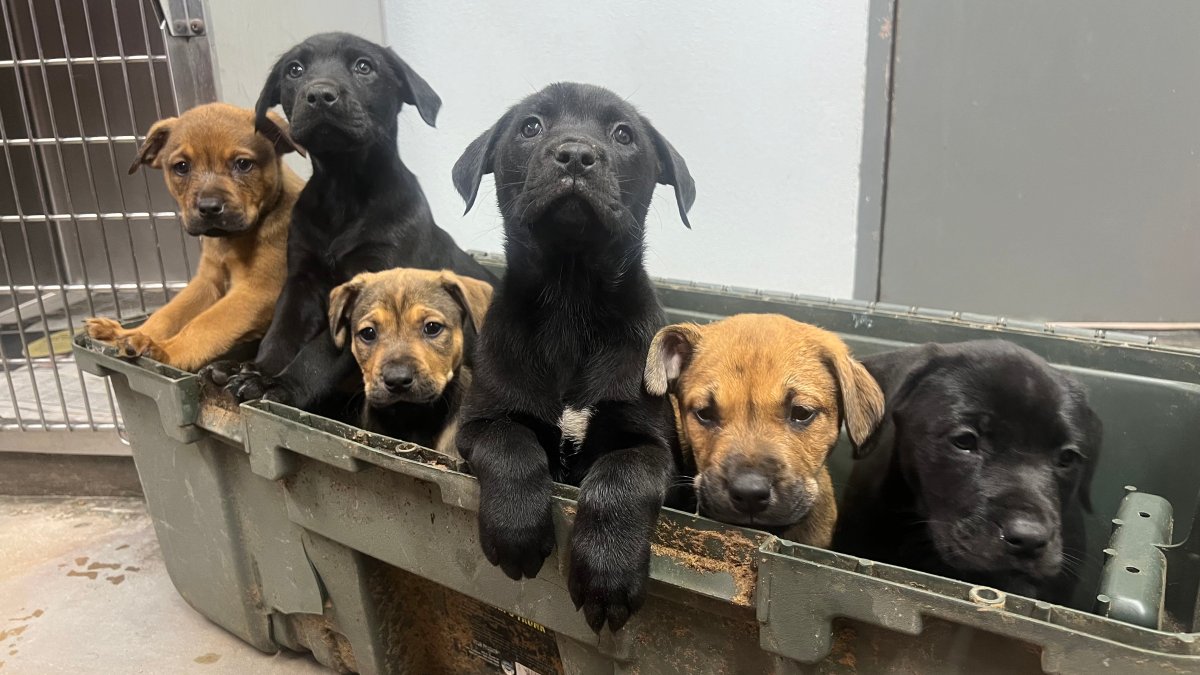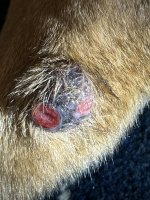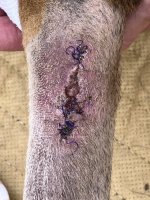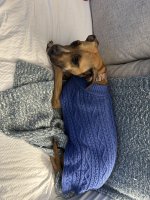I'm going to start calling UC Davis in the morning (hopefully they'll answer the phones). They have a vet school but I don't know if they do small animals, it's mostly ag. And... I've been in communist controlled territory before.
My problem with the Manuka is that I don't know enough about it to say when it's time to say it's not working. There's very little, to no, new granulation (it doesn't look overly wet to me, but the margins are pink) and the Manuka prevents the wet to dry technique. Thankfully nothing is sticking in the hole but I also can't see that the margins are contracting; probably because we are still in the inflammation phase. We've identified one regional vet that has some extensive small animal surgery out east and has relocated here but he won't be back in the area until Thurs. Most of the local offices are closed until Wed, so we're just trying the least risky treatment until we can get somebody experienced and competent on it.
This is our sixth Akita (we have two now) and lost two the hard way so we're all in on this one. If the vac is an option, I'm for it
You are on the right track - I can't imagine a vet school not doing small"/companion animals,even though they ay be "known" for something else. I know here in DFW there is a tertiary vet center that literally has every specialty - they are $$$$$ but they are here. And we have Texs A&M and Texas Tech.
Edit: See below!
I mentioned I did some research and there are literally (same title) animal "plastic and reconstructive" surgeons. (Many people have the misconception that plastic surgery is named after silicone implants/plastic parts, it's actually referring to the plasticity of skin). If they are doing tissue expanders to close wounds from paw orthoedic surgery, there has to be somebody doing good wound care as long as you can pay.I think tissue expanders still may be the way to go.
-------------------------------------------------------------------------------------------------------------------------------------
Try calling this person: And they do clinical trials which may make this financially feasible.
https://www.vetmed.ucdavis.edu › hospital › small-animal › soft-tissue-surgery
Aug 4, 2023Small Animal Clinic Soft Tissue
Surgery Service Contact Soft Tissue
Surgery Service Telephone (530) 752-1393 Location
UC Davis Health Science District VMTH 1 Garrod Drive
Davis, California Discover the latest
surgery clinical trials at
UC Davis Soft Tissue
Surgery Service
Soft Tissue Surgery Service
Breadcrumb
- Home
- Veterinary Hospital
- Small Animal Clinic
- Soft Tissue Surgery Service
Contact
Soft Tissue Surgery Service
Telephone
(530) 752-1393
Location
UC Davis Health Science District
VMTH
1 Garrod Drive
Davis, California
Discover the latest surgery clinical trials at UC Davis
Soft Tissue Surgery Service
Welcome to the Soft Tissue Surgery Service at the UC Davis Veterinary Medical Teaching Hospital. Our board-certified faculty surgeons lead a team that also includes resident veterinarians, highly-skilled technicians and fourth-year students of the School of Veterinary Medicine. Working together with post-operative support staff and board-certified veterinary anesthetists, this team provides cutting-edge surgical procedures. Utilizing the most current surgical technology, our surgeons are leading the way in new veterinary surgeries, and forging new paths to optimal pet health.
The mission of the Soft Tissue Surgery Service includes:
- Teach veterinary students and train residents about surgical disease and treatments
- Provide the best surgical and medical care to animals with surgical conditions using evidenced based medicine
- Advance surgical practice by doing scientific research and clinical trials in our specialty
Clinical Activities and Procedures
The Soft Tissue Surgery Service offers specialized veterinary procedures: cardiothoracic, gastrointestinal, respiratory, urogenital, reconstructive surgery, and a multitude of interventional radiology techniques.
Advanced diagnostics provided:
- Computed tomography (CT scan)
- Magnetic resonance imaging (MRI)
- Ultrasonography -Nuclear scintigraphy
- Fluoroscopy
Interventional Radiology:
IR is a specialty in veterinary medicine, being pioneered at UC Davis, that utilizes imaging modalities (eg., fluoroscopy, ultrasound, computed tomography) to perform minimally invasive procedures for diagnostic and therapeutic purposes.
View the IR Website
---------------------------------------------------------------------------------------------------------------
Important for OP ofthis thread: OI could not open up any other links or access their website and webpage until I logged off of the hide and disabled my VPN.







